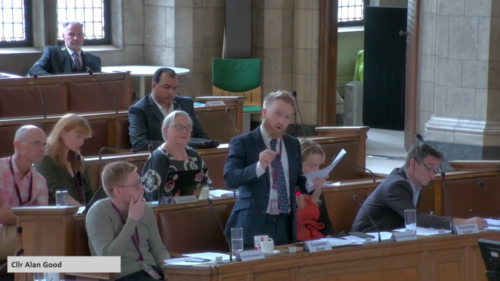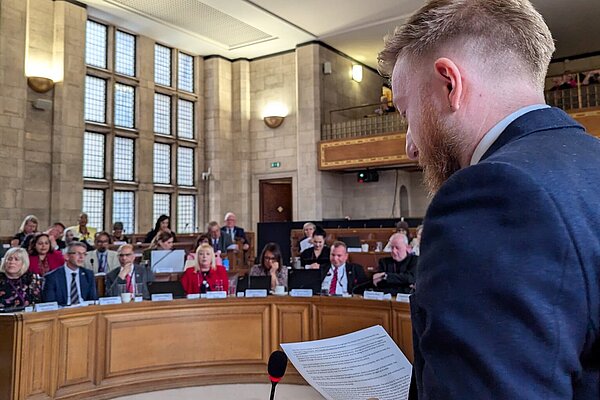Manchester Labour Rejects Lib Dem Call to End Two-Child Benefit Cap

Manchester Liberal Democrats are dismayed that Manchester Labour will not join them in calling for an end to the cruel Tory policy of the two-child limit on Universal Credit and Child Tax Credit, which affects approximately 1.4 million children across the UK (CPAG), at a meeting of Manchester City Council's full council on Wednesday 10 July 2024.
Councillor Alan Good said: "I'm disappointed that Manchester's local Labour councillors have refused to back calls for this simple change that would make a huge difference to child poverty in Manchester. One in five children in Manchester live in a household affected by this cruel policy.
"Now, more than ever, families need support in the cost of living crisis. The Prime Minister must not delay support and lift the cap.
"Recent evidence indicates that removal of the two-child benefit cap could lift 250,000 children in the UK out of poverty with immediate effect."The Liberal Democrats condemn the continuation of this cruel Tory policy."
### ENDS ###

Notes to editors:
-
Number of Affected Households: Approximately 1.1 million households in the UK are affected by the two-child limit policy on Universal Credit and Child Tax Credit (Child Poverty Action Group (CPAG), April 2022 report).
-
Children Affected: Around 1.4 million children live in households impacted by the two-child limit policy (Child Poverty Action Group (CPAG), April 2022 report).
-
Poverty Reduction: Research by the Child Poverty Action Group (CPAG) indicates that removing the two-child limit could lift around 250,000 children out of poverty (Child Poverty Action Group (CPAG) and Policy in Practice, analysis report).
-
Financial Impact per Family: Families affected by the two-child limit lose up to £2,935 per year for each child beyond the first two (Child Poverty Action Group (CPAG), April 2022 report).
-
Regional Impact: In Manchester, approximately 20% (one in five) of children live in households affected by the two-child limit policy (Greater Manchester Poverty Action, report on local impacts).
-
Cost of Living Crisis: The ongoing cost of living crisis has exacerbated financial pressures on families, making the support provided by benefits more crucial (Source: Office for National Statistics (ONS), 2023 report on inflation and cost of living).
Submitted motion to 10 July 2024 Council
Notice of Motion - Tell Kier Starmer to Scrap the 2 child benefit cap
The two-child limit on Universal Credit and Child Tax Credit was introduced in April 2017 by the Conservative government and prevents families in need from claiming targeted financial support for more than two children.
As of 2024, families receive £3,455 a year for their second child under the child element of Universal Credit, and families subject to the cap lose out on this amount per year for each subsequent child. The policy has been widely regarded as a principal driver of child poverty.
This Council notes that:
- Manchester has one of the highest poverty rates of any local authority in the UK.
- Children who grow up in poverty are more likely to experience mental health issues, poorer educational attainment, and worse job opportunities later in life.
- A new report by the Commons Education Select Committee warns mental health problems and cost-of-living pressures on families are among the complex reasons for increased absenteeism at school.
- As of 2022, 20% of all children in Manchester are living in a family affected by the two-child limit, with over 7,100 households affected.
- Manchester Council has a duty to advocate for these families in need, and a duty to pressure the government of the day to pursue welfare policies that alleviate poverty and the causes of poverty.
- 250,000 children would be immediately lifted out of poverty upon removal of the policy, according to the Child Poverty Action Group.
This Council also notes that:
- The Institute for Fiscal Studies has reported that in the next year, 250,000 extra children are likely to be affected by the policy, and by the end of the next Parliament, an extra 670,000 children will likely be affected.
- The upfront cost of removing the two-child limit will be approximately £3.4 billion a year in the financial year 2024/25 according to the IFS, which amounts to roughly 3% of the total working-age benefit budget.
- The impact of the two-child limit policy has disproportionately impacted Muslim and Jewish communities more than any other faith group.
- The then-Labour MP for Manchester Gorton, Afzal Khan, highlighted the impact of the two-child limit on Manchester’s Muslim community at a recent House of Commons debate.
This Council supports:
- Further research into potential savings on the long-term costs of removing the two-child limit, which the Institute for Fiscal Studies suggests may reduce as overall life outcomes improve.
- Wider work in the community to alleviate poverty, for example, improving access to jobs with good wages and reducing the levels of unclaimed benefit when there is entitlement.
This Council therefore resolves to:
- Oppose the two-child limit on Working Tax Credit and Universal Credit.
- Ask the Leader of the Council to write to the Prime Minister to highlight the impact the two-child benefit cap has had in Manchester, and request the policy be scrapped.
Proposed by Councillor Good (Lib Dem), seconded by Councillor Leech (Lib Dem) and supported by Councillors Abdullatif (Independant), Johnson (Green), Kilpatrick (Lib Dem), Northwood (Lib Dem), Nunney (Green) and Wiest (Green).
